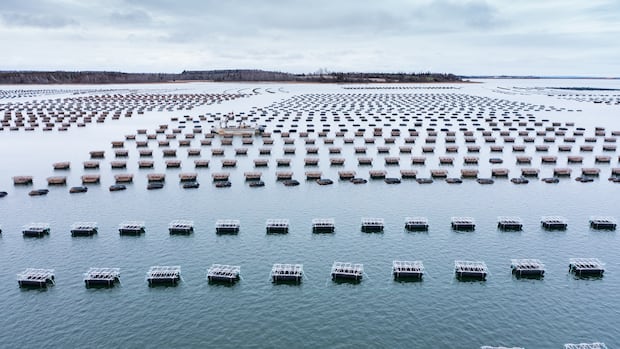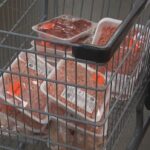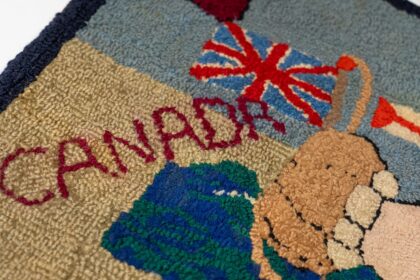PEIA P.E.I. company is seeking approval to import disease-resistant oyster seed and broodstock from the United States. Some Island oyster growers support the idea, but many in the wild oyster industry do not.Some in the industry support the idea, but others are concerned about the possibility of new diseasesRyan McKellop · CBC News · Posted: Nov 12, 2025 5:00 AM EST | Last Updated: 4 hours agoListen to this articleEstimated 4 minutesThe audio version of this article is generated by text-to-speech, a technology based on artificial intelligence.’We are very concerned about the future of our farm,’ says Meredith White, director of hatcheries for Atlantic Aqua Farms. The company has applied to import disease-resistant oyster seed and broodstock from the U.S. (Jane Robertson/CBC)A P.E.I. company is seeking approval to import disease-resistant oyster seed and broodstock from the United States as the Island’s oyster industry struggles with MSX and dermo.Neither of the diseases — which were both recently detected in Island waters — poses a risk to humans, but can be deadly for oysters.Atlantic Aqua Farms has applied to the Canadian Food Inspection Agency (CFIA) and the Fisheries and Oceans Canada, or DFO, to start importing the oyster seed and broodstock as soon as possible.”We would have liked to see the approval for this year, because we are very concerned about the future of our farm,” said Meredith White, the director of hatcheries for Atlantic Aqua Farms. “Atlantic Aqua Farms is very fortunate that we haven’t had significant mortality, but we do have a significant number of our oysters testing positive for MSX….”We are anticipating the mortality to come, and we certainly understand that the industry has severely suffered on the Island.”White said there are some concerns that the U.S. animals wouldn’t survive P.E.I. winters, but they are grown by the company in Maine and have been tested for cold weather survival. The imports would also go into a quarantined facility to address concerns about importing new diseases — but for some, that’s not enough.’Why take a chance?’Bob MacLeod, president of the P.E.I. Shellfish Association representing wild oyster fishers, is among those with concerns.”Why take a chance and take in another disease? Like, we don’t know how these diseases got here now,” he said. “So to open the door… to take in product from the States, who knows where the disease is going to come in?”Bob MacLeod, president of the P.E.I. Shellfish Association, says he is concerned oyster seed and broodstock imported from the U.S. could introduce new diseases to Island waters. (Jane Robertson/CBC)MacLeod is also worried about the effect the imports could have on wild oyster fishers.”I don’t think too much of it because it’s triploid oysters that don’t reproduce, so that’s not really helping the wild industry at all,” he said.”Why would we want to jeopardize what we have? P.E.I. is known for Malpeque oysters, and these are not Malpeque oysters.”‘A step in the right direction’There are others who are in support of importing the seed and broodstock from the south of the border.Darcy Foley, president of the Island Oyster Growers Group, told CBC News it’s a good move.Darcy Foley, president of Island Oyster Growers Group, says importing oyster seed and broodstock from the U.S. is a step in the right direction. (Jane Robertson/CBC)”I think it’s probably a step in the right direction,” he said. “If we leave this too long there will be no oysters to grow anyway.”The group recently voted in favour of the proposal.”It was pretty unanimous that all growers support [Atlantic Aqua Farms] in their plan,” Foley said, adding that the risk of bringing in new diseases is being addressed.”There already will be precautions. It’ll all be done in labs and hatcheries, and I think we’re pretty safe in that aspect.”Foley said the industry is looking to get approval from the CFIA as soon as possible.”We’re already seeing growers… [with] high mortalities, and I think it’s just a matter of time before the rest of the industry feels the same thing.”Years to yield resultsEven if the import by Atlantic Aqua Farms is approved for 2026, White said it will still take years to get any results.”Any delay after that is pushing this down the road,” he said. “[We’re] very concerned about the state of the industry, with significant mortalities that many farmers are seeing.”In the meantime, Foley said this winter will be a tough one for those in the industry.”The cages are down now, so we kind of get a little break from thinking about it. But once we raise them again, you’ll be back in, face first into it.”With files from Nancy Russell
P.E.I. company seeks approval to import disease-resistant oyster stock from the U.S.











